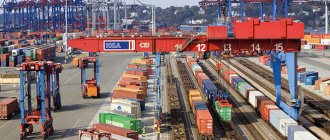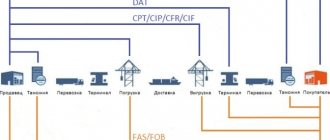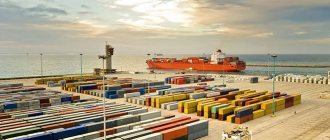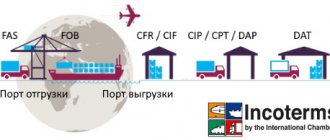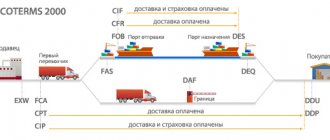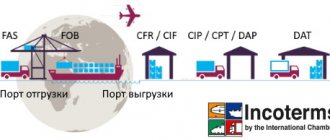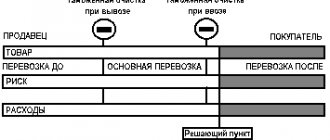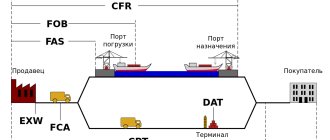Author of the article
Evgeniy Sergeevich Kobzar
Reading time: 8 minutes
AA
INCOTERMS is a thesaurus accepted throughout the civilized world, designed to unify and bring to a common denominator the basic terms and concepts in international trade in order to avoid different interpretations by the parties to the contract of its fundamental points.
This collection of rules covers the distribution of transport costs and determines the moment of transfer of responsibility for the goods from the seller to the buyer.
INCOTERMS 2010 identifies 11 main terms and EXW is the first of them.
What does EXW mean: decoding
The term EXW is derived from the phrase “Ex Works” / “ExWarehouse”, which is translated from English literally as “from / “from warehouse”. In the light of the International Rules for the Interpretation of Trade Terms “Incoterms 2010”, it is used as one of the rules observed by the parties to an international trade partnership when making deliveries from one country to another.
This term, along with other concepts disclosed by Incoterms, is included in the export and import sales contract in all countries and serves as guidance for importers, exporters, logisticians, insurers and other parties to the international transportation process.
Relevance for 2021
According to the rules disclosing international trade terms in 2019, the delivery terms of Incoterms, last revised in mid-2010 and adopted on January 1, 2011, will be relevant. From the first day of next year, it is planned to increase rates.
The benefits of EXW are obvious to the seller, and the client has the opportunity to choose inexpensive cargo transportation, obtain favorable insurance and freely move products abroad. Proper organization of cargo transportation to exporting countries and good orientation in their conditions will allow the buyer to receive additional income due to the low cost of purchase.
When choosing shipment according to Incoterms, strict adherence to terminology is very important. When drawing up documents, parties to the transaction must use only English, indicating the codes of these bases, as well as the most accurate address of the places where the products are shipped.
Incoterms provide the opportunity to use electronic document management; a detailed description of the delivery of goods must be specified in the contract.
about the author
Grigory Znayko Journalist, entrepreneur. I run my own business and know first-hand the problems and difficulties that individual entrepreneurs and LLCs face.
Transfer of ownership and risks
The moment the supplier fulfills its obligations to supply products and the moment of transfer of ownership rights, when it comes to the EXW delivery basis, is generally considered to be the moment the goods are accepted by the buyer or the carrier at the seller’s warehouse/factory.
The seller is not responsible for loading the goods, paying customs duties (and VAT in the country of arrival), or completing customs documentation.
All costs incurred during the export of goods, undergoing relevant procedures at the border, insurance, and building a logistics chain are borne by the buyer.
When using the term EXW, you must always indicate the location of the seller in the documents.
EXW conditions do not apply only if the buyer, for one reason or another, is unable to go through the customs clearance procedure for the cargo.
Are you sure that the EXW condition suits you?
Fill out the form and we will select the most favorable conditions for you
Free consultation
You can also write to us by email or call our toll-free number:
8
Delivery terms CFR Incoterms
Delivery terms CFR Incoterms
- stands for “Cost and Freight” named port of destination (translation “Cost and Freight” specified port of destination) means that the seller has made delivery when the goods are placed on board the ship at the port of shipment. The seller must pay the costs and freight necessary to bring the goods to the named port of destination, and the risk of loss or damage to the goods, as well as any additional costs, passes from the seller to the buyer when the goods are placed on board the ship at the port of shipment. When placing goods in a container, it is typical for the seller to hand over the goods to the carrier at the terminal rather than by placing them on board the vessel, in such cases CPT terms of delivery should be used. Under CFR terms of delivery, the buyer assumes all risks of loss or damage to the goods, as well as other costs, after the goods are handed over to the carrier by the seller, and not when the goods reach their destination. The term CFR contains two critical points because the risk and costs are transferred in two different places.
What is an ex-warehouse?
Ex-warehouse means that, according to the delivery basis, ownership of the goods passes from the seller to the buyer already at the warehouse (factory, factory, other outlet).
In Incoterms there are two concepts associated with the term ex-warehouse: ex-warehouse of the supplier (seller) and ex-warehouse of the buyer.
Ex-warehouse of the supplier (seller)
This term means the delivery basis, which provides for the transfer of ownership of goods from the seller to the buyer already at the supplier’s warehouse. As a result, the buyer, in addition to paying for the goods, bears the following costs:
- Obtaining an export and/or import license depending on the category of goods, completing all formalities at customs, including customs payments.
- Transportation of products to their destination;
- Cargo insurance.
In addition, the buyer undertakes:
- Accept delivery of the goods immediately after they are placed at his disposal;
- Bear risks from the moment of delivery of the goods;
- Bear costs associated with the product from the moment of its delivery, including for untimely removal;
- Agree on the date and place of delivery of the goods;
- Notify the seller of receipt of the goods by transferring transport documents, sending an electronic message or in any other way specified in the delivery agreement;
- Carry out pre-loading inspection of goods.
For its part, the seller is responsible for the following items:
- Providing products that have not been shipped to the vehicle at the disposal of the buyer on the date and time specified in the contract;
- Risk obligations until delivery;
- Proper quality of the product, its compliance with the contract;
- Costs associated with the supplied products prior to delivery;
- Notifying the buyer of the date and place of delivery of the goods;
- Product packaging and labeling.
In addition, there are a number of other obligations. Thus, the buyer bears the costs and pays fees when receiving documents that may be needed for export of goods, for transit transportation across the borders of other states.
For its part, the seller is obliged to provide every possible assistance in completing all necessary documentation.
Buyer's ex-warehouse
Buyer's ex-warehouse means that the seller's title to the delivered goods is lost once it is delivered to the buyer's warehouse.
In this case, the seller assumes the costs of transporting the goods to the destination and bears all kinds of risks when moving the goods. Otherwise, the obligations of the supplier and the buyer are identical to those when choosing the seller's ex-warehouse. Go to the list of all Incoterms terms
What are Incoterms and what are they for?
Incoterms (or in Russian "Incoterms") are a set of standard terms of delivery of goods for use in international trade. The main advantage of Incoterms is its unambiguous interpretation throughout the world.
The system itself appeared in 1936 and has since gone through several editions, the latest being Incoterms-2010. The 2021 version is currently in development.
What essential delivery terms are determined by the Incoterms basis:
- distribution between the seller and the buyer of the costs of delivery and customs clearance of goods, i.e. what logistics services are included in the price of the product;
- the moment of transfer from the seller to the buyer of the risks of damage, loss or accidental destruction of the cargo;
- the moment of delivery by the seller.
Incoterms are optional, and you are free to include any other terms in the contract, but I do not recommend doing so. On the contrary, the wording on the mandatory execution of Incoterms in a foreign trade contract will be an example of good legal practice.
Why is this so important?
Because the costs of delivery and customs clearance may exceed the purchase price of the product itself. And who will bear them: the seller or the buyer will significantly affect your financial result.
Agree, the price is $10 with delivery of the goods at the factory gate in the country of manufacture (EXW) and the same $10, but including export registration and delivery to the Russian Federation (CFR) - these are, as they say in Odessa, two big differences!
Therefore, when comparing prices from different suppliers, it is necessary to pay attention to the stated conditions according to Incoterms. Or decide in advance what you need and immediately request an EXW, FOB or CFR price.
What is a free factory?
The term “ex works” followed by the exact name of the place of delivery means the delivery of goods by the seller to the buyer at his premises or another place agreed upon by the other party to the contract. So, if the seller’s plant is located in a small town, in this case in the supply contract after the term EXW there should be an indication of the nearest large city where the ex-factory is located. For example, it is planned to export products from the Artyomovskaya knitting factory (Artem). In this case, it is necessary to write in the contract as follows: “EXW Vladivostok, Primorsky Territory, Russian Federation.”
EXW term
EXW is an abbreviation for Ex Works, derived from the German "Ab Werk".
The literal translation into Russian is “from warehouse”, a more accepted translation is “free warehouse”. In trade parlance - “pickup”. The term EXW is used together with the name of the locality where the plant is located. A few important clarifications:
- In practice, it is customary to indicate the region and country in parentheses. If the plant is located in a small locality, then the nearest administrative center is indicated, but in the addition to the contract or in the details of the invoice document, the exact address of cargo collection must be indicated. For example, the contract states the terms: EXW Truro (Cornwall, UK), and then the details indicate the address: “11 km Richmond Road, Blackwater, Truro, TR4 8HQ, Cornwall, UK.”
- Although EXW literally means “ex-warehouse,” the use of the term does not mean that finished products must be located in the warehouse. This could be the conditions of a plant, factory, any transshipment point, store, supplier or intermediary premises, convenient from the seller’s point of view for the buyer’s carrier to pick up the products.
Having a problem? Call our customs specialist:
8-495-565-32-46
What is the EXW price?
EXW pricing has some features related to minimizing the seller’s financial obligations. He is responsible only for the availability of the required volume of goods of appropriate quality, packaged and labeled, and providing access to the warehouse for loading.
As a result, according to the terms of delivery ex-factory, the buyer will need to provide a certain amount for transportation of the product, its customs clearance and other payments related to the peculiarities of the customs legislation of the manufacturing country and the country where the cargo is destined.
Upon reaching consensus and specifying the relevant obligations in the supply contract, in addition to the price of the product, the EXW contract may include a price for loading the goods and transporting them to the border.
To summarize, it should be noted that when shipping goods on EXW terms, the buyer needs to discuss everything with the seller, down to the smallest detail, and secure the points in the contract. Otherwise, there is a risk of increasing import costs as a result of the lack of certain documents, failure to ensure timely delivery, etc.
Regulatory framework
International conventions and agreements, which were adopted quite a long time ago, regulate international cargo transportation.
Sea and multimodal transport are regulated by:
- the Brussels Conventions, which unifies some Hague rules on bills of lading since 1924, including the Hague-Visby rules since 1968;
- the UN Hamburg Convention on the Carriage of Goods by Sea, adopted in 1978;
- The UN Convention on International Multimodal Transport of Goods since 1980, that is, the Geneva Convention.
- The UN Convention on the whole or partial carriage of goods by sea, drawn up in 2009.
Road transportation is carried out in accordance with:
- Geneva Convention on the Treaty for the International Carriage of Goods by Road, adopted in 1956;
- Customs Convention on International Transport of Goods, using the TIR Carnet since 1975;
- European Agreement concerning the International Carriage of Dangerous Goods by Road, drawn up in 1957.
Rail transportation is organized in accordance with:
- the Convention on International Carriage by Rail, adopted in 1980;
- Agreement on International Freight Services by Rail since 1951.
Air transportation is carried out based on:
- the Warsaw Convention, unifying certain rules for international air transport, adopted in 1929;
- Montreal Convention, drawn up in 1999.
Delivery terms CIP Incoterms
Delivery terms CIP Incoterms
- stands for “Carriage and Insurance Paid to” named place of destination (translation “Freight/carriage and insurance paid to” the specified name of the destination) means that the seller completed the delivery when he transferred the goods insured by him, released under the customs regime of export, named by him to the carrier. In addition, the seller is obliged to pay the costs associated with transporting the goods to the specified destination. However, under CIP terms of delivery, the seller is also obligated to provide insurance against the risks of loss and damage to the goods during transit for the benefit of the buyer. Consequently, the seller enters into an insurance contract and pays the insurance premiums. The term CIP contains two critical points because the risk and costs are transferred in two different places. This means that the buyer assumes all risks and any additional costs after the seller hands over the goods to the carrier, and not when the goods reach their destination.
Delivery terms CPT Incoterms
Delivery terms CPT Incoterms
- stands for “Carriage Paid To” named place of destination (translation “Freight/carriage paid to” the specified name of the destination) means that the seller completed the delivery when he transferred the goods released under the customs export regime to the carrier named by him. In addition, the seller is obliged to pay the costs associated with transporting the goods to the specified destination. The term CPT contains two critical points because the risk and costs are transferred to two different places. This means that the buyer assumes all risks of loss or damage to the goods, as well as other costs, after the seller hands over the goods to the carrier, and not when the goods reach their destination.
Delivery terms DAP Incoterms
Delivery terms DAP Incoterms
- stands for “Delivered At Point” named point of destination (translation “Delivery at the point” indicated name of the point of destination) means that the seller fulfilled his delivery obligation when he provided the buyer with goods released under the customs export regime and ready for unloading from the transport means arriving at the specified destination. DAP terms of delivery oblige the seller to bear all costs and risks associated with transporting the goods to their destination, including (where required) any duties for export from the destination country.
Delivery terms CIF Incoterms
Delivery terms CIF Incoterms
- stands for “Cost, Insurance and Freight” named port of destination (translation “Cost, insurance and freight” specified port of destination) means that the seller has made delivery when the goods insured by him are placed on board the ship at the port of shipment. The seller must pay the costs and freight necessary to bring the goods to the named port of destination, but the risk of loss or damage to the goods, as well as any additional costs incurred after the goods have been shipped, pass from the seller to the buyer when the goods are placed on board the vessel at the port of shipment. However, under CIP terms of delivery, the seller is also obligated to provide insurance against the risks of loss and damage to the goods during transit for the benefit of the buyer. Consequently, the seller enters into an insurance contract and pays the insurance premiums. When placing goods in a container, it is typical for the seller to hand over the goods to the carrier at the terminal rather than by placing them on board the vessel, in such cases CIP terms of delivery should be used. Under CIF terms of delivery, the buyer assumes all risks of loss or damage to the goods, as well as other costs, after the seller hands over the goods to the carrier, and not when the goods reach their destination. The term CIF contains two critical points because the risk and costs are transferred in two different places.

